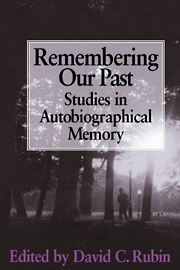Book contents
- Frontmatter
- Contents
- List of contributors
- 1 Introduction
- Part I Approaches
- 2 What is recollective memory?
- 3 Autobiographical knowledge and autobiographical memories
- 4 Autobiographical remembering: Narrative constraints on objectified selves
- Part II Accuracy
- Part III Emotions
- Part IV Social functions
- Part V Development and disruption
- Subject index
- Author index
4 - Autobiographical remembering: Narrative constraints on objectified selves
Published online by Cambridge University Press: 14 October 2009
- Frontmatter
- Contents
- List of contributors
- 1 Introduction
- Part I Approaches
- 2 What is recollective memory?
- 3 Autobiographical knowledge and autobiographical memories
- 4 Autobiographical remembering: Narrative constraints on objectified selves
- Part II Accuracy
- Part III Emotions
- Part IV Social functions
- Part V Development and disruption
- Subject index
- Author index
Summary
The general purposes of this essay are as follows: First, to outline an ecological model of autobiographical remembering by examining the purposes, processes, and products of reconstructing meaningful memories. Second, to argue that autobiographical remembering is embedded in affective, interpersonal, sociocultural, and historical contexts. Improvized selves are created in present contexts to serve psychosocial, cultural, and historical purposes, and third, to demonstrate essential constraints on the construction of coherent personal narratives that give meaning and purpose to our everyday lives.
The specific aim of this essay is to illustrate that the subjective experiences of trauma and atrocity often lack the essential narrative elements needed to give coherence to those experiences as well as affectively grounded evaluative information. Evaluations of experiences give meaning to our lives. Evaluative information leads to culturally recognized coherent stories structured by known canonical narrative forms because affect conveys how subjective experiences should be interpreted and understood. On this view, autobiographical memories that are the essence of one's personal history can appear as coherent or incoherent to others to the extent others are familiar with the narrative structure used to reconstruct the past and the coherence inherent in autobiographical memories associated with the temporal and evaluative structure of those recollections.
I claim that autobiographical experiences that cannot be reconstructed and shared through spoken or written language, music, movement (e.g., dance), art, literature, or science precipitate feelings of existential stress because articulated deep motivations cannot be related intimately to others.
- Type
- Chapter
- Information
- Remembering our PastStudies in Autobiographical Memory, pp. 94 - 126Publisher: Cambridge University PressPrint publication year: 1996
- 53
- Cited by

